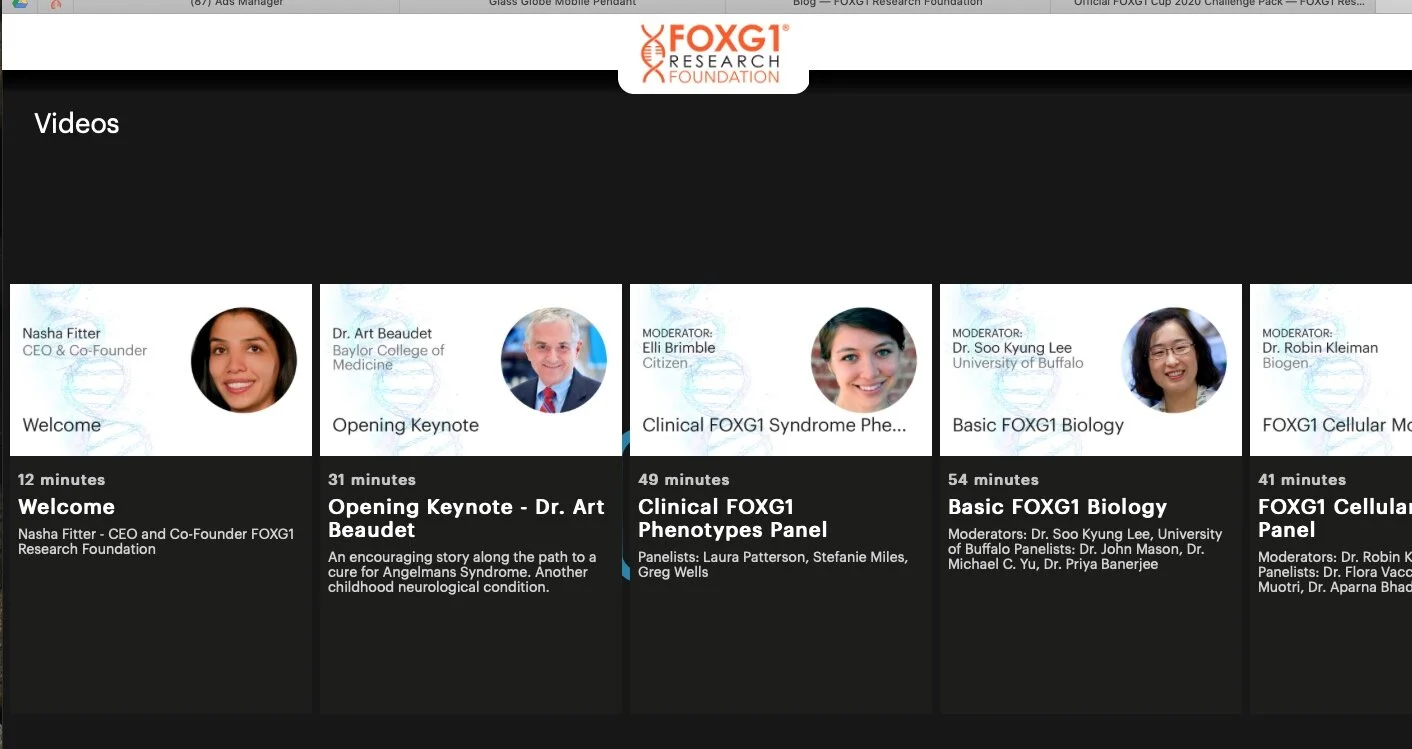FOXG1 Research Foundation's Nasha Fitter Speaks At The White House Rare Disease Forum
FOXG1 Research Foundation Co-founder and CEO Nasha Fitter was the first spotlight speaker at the White House Rare Disease Forum hosted by the White House Office of Science and Technology Policy's Health Outcomes Team February 28th ahead of Rare Disease Day 2024.
November 2020 Research Update : Creyon Bio Takes on FOXG1 for ASOs!
November 2020 FOXG1 Research Foundation Research Update: Two Biotech companies are investing in FOXG1 syndrome for gene therapy and ASO therapy. FOXG1 Research is moving into screening drugs and testing potential therapies with a newly assembled consortium of esteemed scientists.
The FOXG1 Science Symposium 2020 - Recap
The virtual FOXG1 Science Symposium 2020 was a tremendous success in demonstrating the work towards advancing science to find a cure for FOXG1 syndrome. Scientists from Tokyo, the UK, Italy, California and more gathered with Biopharma industry executives and FOXG1 caregivers to share data and engage in collaborative discussions towards disease-modifying therapies. Read the recap here and watch the panel discussions.
FOXG1 Symposium Advances Science, Gives Hope to Families Battling Rare Disease
UB biological sciences faculty member Soo-Kyung Lee, left, and UB biological sciences researcher Younjung Park work in the lab. Photo: Douglas Levere
The Rare Disease Crusaders
I joined Ciitizen and initiated our entry into neurological diseases because I am both passionate and desperate to find an answer for my daughter. At Ciitizen, we’re creating a platform where medical records are collected on behalf of each patient, then automatically digitized into the computational data we need. From there, sophisticated machine learning technology is used to extract clinical data in order to create regulatory-grade Natural History Studies that do not require exorbitant amounts of time, energy, or money. Patient reported outcomes can then be added by us parents.
More importantly, this database of computational data we’re creating will be accessible and open to all patients, parents, caregivers, clinicians, academics, and biopharma researchers. Our goal is to eliminate the slow, manual, and expensive processes that we currently use to collect information and use the best technologies to be quick, cost-effective and more accurate when it comes to developing research.
America Trends TV interviews FOXG1 Research Co-Founder on How to be an Advocate for Your Child
FOXG1 Research Foundation Co-founder and mom to Josie, Nicole Johnson, joined America TV to share the most important lessons how she has learned about being an advocate for a medically complex child with an ultra rare disease.
For two UB scientists, love means studying their daughter's rare disease
University at Buffalo biologists Soo-Kyung Lee (left) and Jae Lee are researching the FOXG1 gene. Their daughter, Yuna, has a mutation in the gene, which has severely impacted her development. The Lees hope their scientific work will lead to a treatment. Credit: Douglas Levere / University at Buffalo.
The Naked Scientist: FOXG1 Syndrome: Fighting the Odds
Listener Vivek got in touch with a question about a rare genetic disease his son has, called FOXG1 Syndrome. In fact, it's so rare - and so newly-discovered - that only about six hundred people in the world have been diagnosed. Kids with FOXG1 have severe developmental delays; in Vivek's words, "everything that can go wrong - it's gone wrong with him." But the parents of FOXG1 children have been unusually tenacious when it comes to shaping the course of science. In this programme we meet those people blurring the line - metaphorically speaking - between the brain and the heart.
The FOXG1 Research Foundation Announces the Launch of its Global Patient Registry to Accelerate Research For the Rare Genetic Disease, FOXG1 Syndrome
Celebrating Rare Disease Day 2019, The FOXG1 Research Foundation, today, launched the critically important FOXG1 Syndrome Patient Registry developed in collaboration with Stanford University and digital health company, Beneufit.
January Newsletter: Big Things in 2019
Looking Back. Moving Ahead.
Wow! 2018 was an incredible first year for the FOXG1 Research Foundation! We cannot thank our supporters, partners, and donors enough for helping to make 2018 an enormously successful year!
2018 Key accomplishments:
• Raised $1.3 Million for research
• Assembled a Scientific Advisory Board consisting of 16 of the world's leaders in
their fields.
• Funded six esteemed scientists' projects along our Path to a Cure in the USA,
UK, and Italy
• Launched the most comprehensive study into FOXG1 to-date,
with eight mouse models of all known FOXG1 categories.
• Developed a global FOXG1 Syndrome Patient Registry
• Developed an iPSC line Patient Biobank







